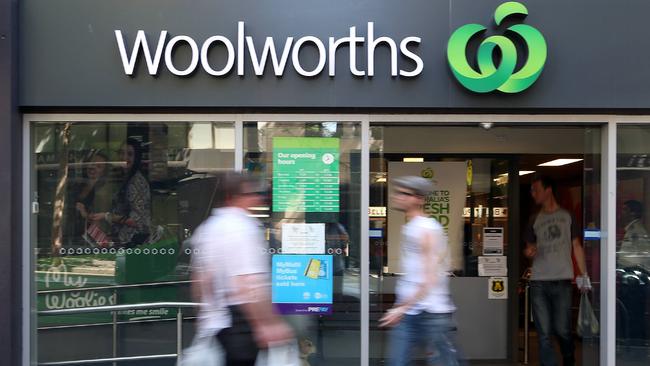Woolworths calls for mandatory code of conduct to cover global rivals Amazon, Costco
Australia’s grocery giants support a mandatory code of conduct, but Woolworths wants global rivals like Amazon and Costco to be held to the same standards.

Business
Don't miss out on the headlines from Business. Followed categories will be added to My News.
Australia’s supermarket giants are supporting moves to make the food and grocery code of conduct mandatory for the country’s largest operators, but Woolworths wants the beefed up rules to be extended to other major retailers, including global heavyweights Amazon and Costco.
Former Labor minister Craig Emerson handed down his interim report into the food and grocery code of conduct on Monday, calling for stronger regulation and punishment for supermarket chains to address market power concerns, including huge fines of up to 10 per cent of annual turnover.
Dr Emerson’s proposal to make the current voluntary code mandatory comes with a recommendation that the Australian Competition & Consumer Commission be given powers to impose strict penalties for breaches.
It is suggested the code be applied to all supermarket operators with annual revenue of more than $5bn. That would currently include Coles, Woolworths and Aldi, and wholesaler Metcash.
The federal government on Monday offered its in-principle support to Dr Emerson’s recommendations, but will consult with industry before a final report is delivered by the end of June.
In response to the interim recommendations on Monday, a Woolworths spokesman said the company supported the creation of a mandatory code of conduct, but the code needed to provide a level playing field for supermarket operators and other competing retailers.
“Woolworths is a foundation signatory to the food and grocery code of conduct, and we support it becoming mandatory for all large retailers and wholesalers of groceries to engender public trust and to level the playing field for retailers and wholesalers alike,” he said in a statement.
“The code should apply to all major retailers operating in Australia, including global retail giants such as Amazon and Costco, who have global revenues many times the size of Australian supermarkets, as well as to large Australian retailers such as Bunnings and Chemist Warehouse who also compete in grocery categories including everyday needs such as household products (e.g. cleaning), and personal care.”
Woolworths first raised its concerns about the limited scope of a new code of conduct in its submission to the review last month, when it suggested the code apply to all “substantial retailers and wholesalers of groceries” with a gross annual turnover of $1bn or more.
Dr Emerson’s mandatory code proposal, which includes provisions protecting suppliers against retribution, includes harsh penalties for rule breaches.
Major or systemic breaches would attract fines of up to $10m, 10 per cent of an operator’s annual turnover or three times the benefit it gained from the breach – whichever is the highest.
Stronger protections for complaints are also recommended, including new channels for making informal complaints and access to independent dispute resolution.
The beefed up code, along with its threat of hefty penalties, has been designed to address the power imbalance between the largest supermarket giants and smaller suppliers, with the review noting that small suppliers are often reluctant to make formal complaints under the voluntary code because of a fear of retribution.
However, Woolworths has warned against a “one-size fits all” approach to formulating a new code of conduct, arguing large multinational suppliers do not require the same protections as smaller local suppliers.
“We believe the protections of the code are best directed at supporting smaller suppliers,” the spokesman said.
“Large Australian and foreign-owned global consumer goods companies supply over 70 per cent of our packaged products by sales and more than 60 per cent of sales across all products.
“Our largest suppliers are sophisticated global companies, many times larger than Woolworths, and many of which supply ‘must stock’ brands and products.”
NFF Horticulture Council welcomed the interim recommendations, but said additional protections were needed for the country’s fruit and vegetable producers, given the “high level of vulnerability due to the perishable nature of horticulture produce”.
It also called for the new code to be extended to hardware and garden giant Bunnings.
“As a virtual monopoly in the ornamental plant market, Bunnings needs to be included in the code to cover its dealings with plant nurseries,” NFF Horticulture Council chair Jolyon Burnett said.
“The issues faced by this sector are identical to the challenges faced by fruit and vegetable growers. It cannot be given a free pass.”
The Australian Food & Grocery Council was equally supportive of the recommendations.
“Whether voluntary or mandatory, suppliers were clear on wanting a strong code that empowers them to resolve disputes fast, cheaply, confidentially, and in a binding manner. Clearly the interim report aims to address that,” chief executive Tanya Barden said.
While arguing for tougher rules and penalties to deter anti-competitive behaviour, Dr Emerson’s review stopped short of backing separate calls from the Coalition and the Greens for break-up powers that would force Coles and Woolworths to sell off stores or certain parts of their businesses.
Monday’s report argues forced divestiture could easily result in greater market concentration if one large chain was forced to sell to another, or result in store closures and job losses if no buyers could be found.
Responding to Monday’s report, a Coles spokeswoman said the company would “continue to work constructively as part of this review process”.
“We remain committed to the objectives of the code in delivering value to our customers while maintaining strong, collaborative relationships with our valued suppliers,” she said.
A Metcash spokeswoman said the wholesaler was considering the detail of the report, including the “implications for our broader business”.
“We have no objection to the code in its current form becoming mandatory for all current signatories, however we look forward to receiving further details on the recommended changes.”
An Aldi spokesman said the company would review the interim report in detail before providing feedback.
“We have been a voluntary signatory to the Australian food and grocery code of conduct since 2015 and we support the code becoming mandatory, as these changes reflect our ongoing commitment to our supply partners,” he said.
Originally published as Woolworths calls for mandatory code of conduct to cover global rivals Amazon, Costco




